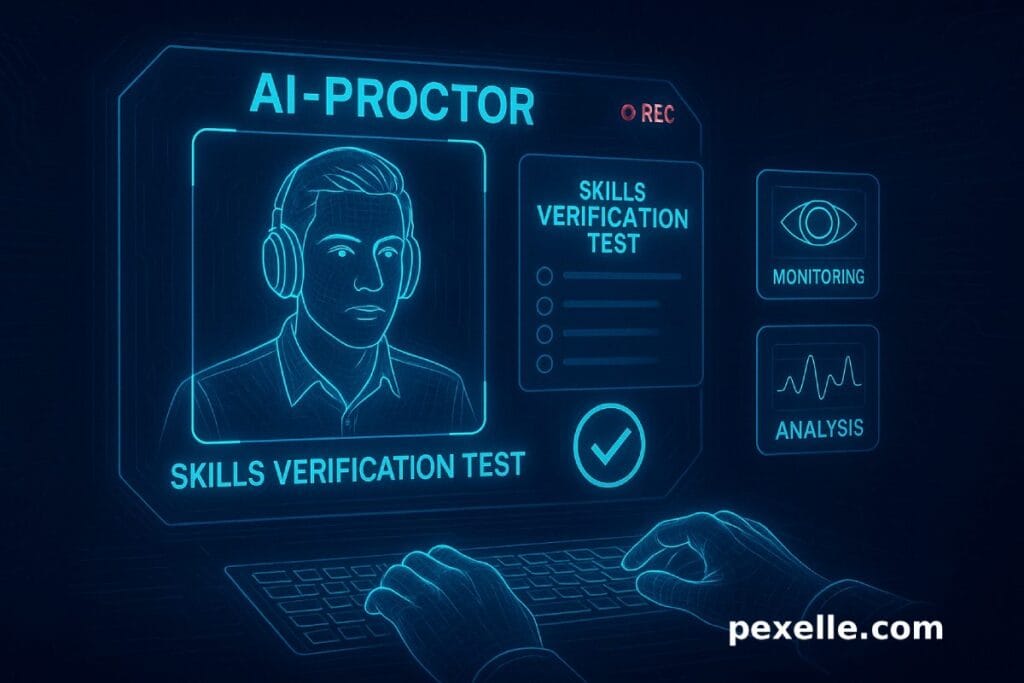AI-Proctored Skills Verification: The Future of Human-Free Skill Assessment

In 2025, skill verification is undergoing its most significant transformation in decades. Traditional exams supervised by human invigilators are no longer capable of matching the scale, speed, and integrity required by a global digital workforce. As remote talent markets expand and micro-skills become the new currency of employability, companies are shifting toward a more scalable, unbiased, and secure approach: AI-Proctored Skills Verification.
This new standard removes the human examiner from the loop and replaces them with an AI system that monitors, analyzes, and validates a candidate’s performance with precision levels a human simply cannot match. It’s not just a technological upgrade; it’s the beginning of a new verification era.
Why Traditional Skill Exams Are Failing
The current assessment ecosystem is broken for three primary reasons:
1. Human invigilators don’t scale
A company evaluating 1,000 candidates per week cannot hire 100 evaluators.
AI can process and supervise unlimited sessions simultaneously without fatigue, bias, or error.
2. Remote work made geography irrelevant
Talent is now global; exams must be global too.
AI doesn’t care where the candidate lives, whether they’re in a dorm room or a rural town.
3. Cheating sophistication is rising
Screen sharing, secondary devices, hidden audio, generative AI traditional proctoring is incapable of handling modern cheating techniques.
AI systems, however, can track behavioral anomalies, multi-device signals, and real-time environmental changes with millisecond-level alerts.
How AI-Proctored Verification Works
A complete AI-supervised exam typically uses a stack of independent verification layers:
🎥 1. Vision-based monitoring
- Face recognition
- Eye movement tracking
- Body posture changes
- Multi-person detection
- Suspicious object detection
🎙️ 2. Audio-based monitoring
- Whisper detection
- Background voice classification
- Pattern-based cheating behavior
🖥️ 3. Screen & input analysis
- Mouse trajectory patterns
- Keyboard rhythm mapping
- Unauthorized window detection
- AI-assisted answering detection (LLM pattern fingerprints)
🌐 4. Environment fingerprinting
- Secondary device detection
- Network anomalies
- Real-time context checks
These independent signals are combined into one final Integrity Score, representing how trustworthy the candidate’s exam session is.
Why Companies Are Adopting AI-Proctored Skills Tests
1. Bias-free evaluation
Human examiners carry unconscious bias.
AI does not care about race, age, nationality, or accent—only behavior and performance.
2. Instant scalability
A company can test 10 people or 10,000 people with the same cost and same reliability.
3. Faster hiring cycles
In many industries, the exam result can be validated instantly—cutting hiring time from weeks to hours.
4. Lower operational cost
No scheduling.
No invigilator fees.
No manual verification.
Where Pexelle Fits In
AI-Proctored Skills Verification is powerful—but alone, it’s incomplete.
Pexelle adds the one thing missing from all modern assessment tools:
🔗 Verified Proof-of-Skill + Skill Provenance
- Every test becomes a blockchain-secured credential.
- Every micro-skill is validated with tamper-proof evidence.
- Every result includes AI-proctoring logs and integrity scoring.
- Every certificate is tied to a user-specific cryptographic identity.
This transforms assessments from simple exams into verifiable, globally trusted skill assets.
Pexelle becomes the missing authenticity layer of the future skills economy.
The Future: Skill Exams Without People
We are approaching a world where:
- No exam will require a human supervisor
- No employer will trust a certificate without verification logs
- No candidate will hide behind inflated résumés
- Skill identity becomes a cryptographic identity
AI will not just observe the exam; it will dynamically adapt it, personalize difficulty levels, and measure behavioral consistency over time.
This is not the automation of testing It’s the automation of trust.
Conclusion
AI-Proctored Skills Verification is not a trend; it is the foundational infrastructure of the future job market.
Companies need faster, more scalable, more trustworthy ways to validate real capability. Candidates need a fair, bias-free system that rewards true skill not credentials.
Pexelle stands at the center of this evolution building a globally verifiable skill identity layer powered by AI supervision and blockchain verification.
The resume era is fading.
The proof-of-skill era has begun.
Source : Medium.com




